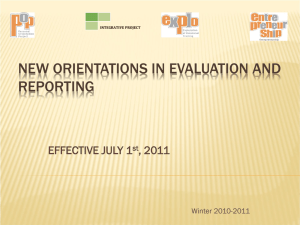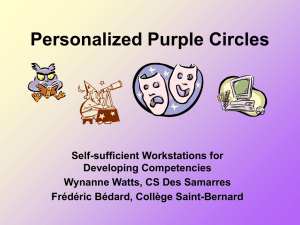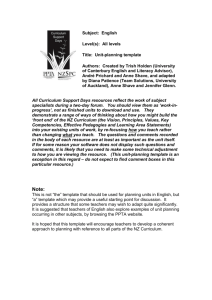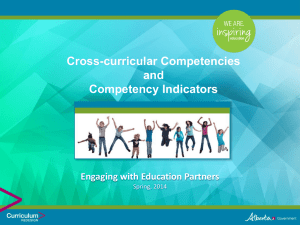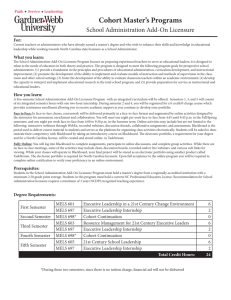Outline
advertisement
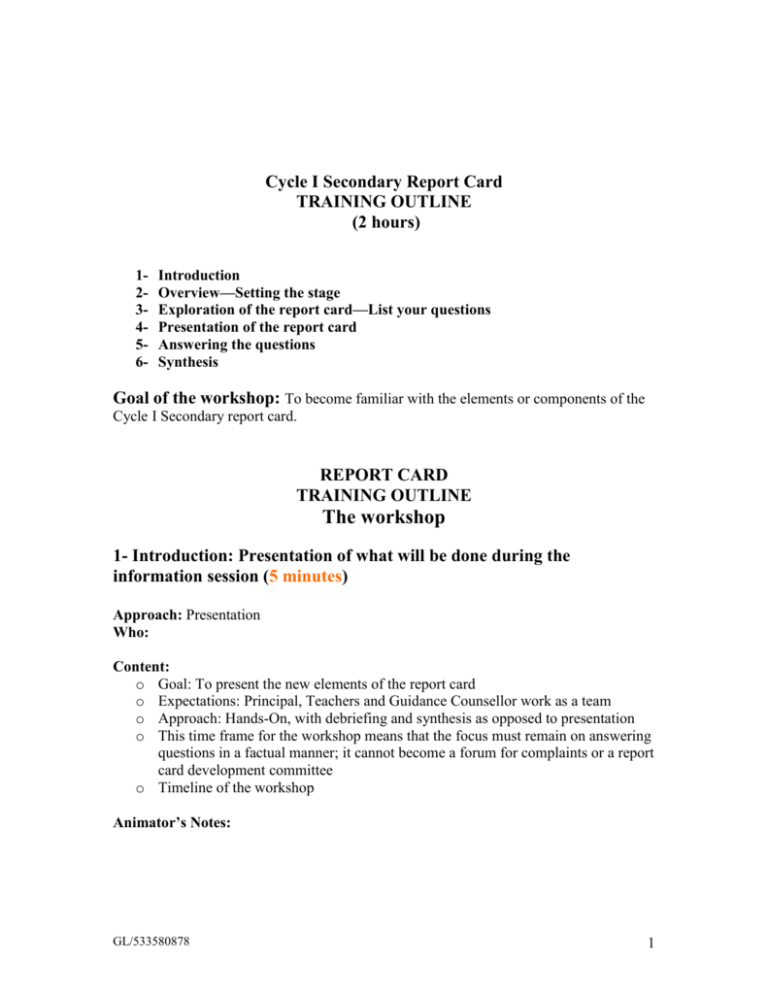
Cycle I Secondary Report Card TRAINING OUTLINE (2 hours) 123456- Introduction Overview—Setting the stage Exploration of the report card—List your questions Presentation of the report card Answering the questions Synthesis Goal of the workshop: To become familiar with the elements or components of the Cycle I Secondary report card. REPORT CARD TRAINING OUTLINE The workshop 1- Introduction: Presentation of what will be done during the information session (5 minutes) Approach: Presentation Who: Content: o Goal: To present the new elements of the report card o Expectations: Principal, Teachers and Guidance Counsellor work as a team o Approach: Hands-On, with debriefing and synthesis as opposed to presentation o This time frame for the workshop means that the focus must remain on answering questions in a factual manner; it cannot become a forum for complaints or a report card development committee o Timeline of the workshop Animator’s Notes: GL/533580878 1 GL/533580878 2 2- Overview: A very brief presentation of the context of the report card. (10 minutes) Approach: Presentation Who: Content: o 6th draft o Outcome of consultation processes: o Report Card Committee: Teachers, School principals etc. o School Principals Meeting for most recent changes o Considers requirements of Basic School Regulations -- have to follow guidelines o Minister’s latest communiqué about the marks and involvement of parents o What needs to be done Material: One page outline of the development of the report card Animator’s Notes: GL/533580878 3 3- Exploration of the new report card –List your questions (30 minutes) o Explanation (5 minutes) o Team Work (25 minutes) Who: Note Takers: Approach: o Teams will be asked to list questions that they have about the new report card. The question template contains five broad categories or themes: 1- Legends and scales 2- Subject Competencies 3- Cross-Curricular competencies 4- Special Needs 5- Other— o Once the teams have completed their list of questions, animators pick up the templates in order to review the questions during the report card presentation. Materials: o Paper copies of the new report card o Template for the list of questions o Template for the answers to the questions o To bring: Scissors or table-cutter Animator’s Notes: GL/533580878 4 4- Presentation of the report card (15 minutes) Who: Approach: o Overall presentation of the main elements of the report card. o During the presentation, participants use the second template to jot down the answers to their questions. Questions left unanswered will be addressed after the presentation. o The other animators review the participants’ questions during the presentation and get ready for the following section of the workshop. Content: The elements of the report card are: o Legend of student progress: The Letter scale with a range in brackets. o End of Cycle Legend : The scale o Assessment of subject competency: Note and cote o Supplementary information including IEP o “Decision Making Area”—Information about promotion and classement o Comments and messages o Assessment of cross-curricular competency Materials: o Electronic version of the new report card to project Animator’s Notes: GL/533580878 5 5- Answering the questions (45 minutes) Who: Note Takers: Time keeper: Approach: o Using the list of questions drafted by the participants and based on the content of the presentation, animators answer the people’s questions à tour de rôle. o Each topic should be allocated roughly 9 minutes. o Notes of the questions should be taken during the presentation 12345- Legends and scales Subject Competencies Cross-Curricular competencies Special Needs Other— Animator’s Notes: GL/533580878 6 6- Synthesis (10 minutes) Who: Note Taker: o Wrap-up— Emphasize that the function of the report card is to communicate to parents and students. Make links with other evaluation topics for which further Professional Development will be offered: o The difference between evaluating and reporting o The difference between evaluation of learning and evaluation for learning o Who assesses which cross-curricular competency? o Communicating to parents and students o Differentiation o Support measures for learning and evaluation Materials: □ Hand-out of the draft proposal for PD for next year (drawn from recent Secondary School Principals’ meeting). GL/533580878 7 Workshop materials: □ □ □ □ □ □ □ □ □ □ Latest Version Report Card –Hard Copy Electronic version – Report Card Overview sheet—Setting of the context Placemats of the 5 categories (One per school team) Answer sheets (one per participant) Train the Trainers Outline Offers of Service (Implementation Outline) Computer Projector Scissors Reference Materials: □ Basic School Regulation : http://www.meq.gouv.qc.ca/legislat/regime_ped.htm □ QEP : Quebec Education Program http://www.mels.gouv.qc.ca/DGFJ/dp/programme_de_formation/secondaire/ qepsecfirstcycle.htm □ Yearly Directives: http://www.mels.gouv.qc.ca/DGFJ/instructions/pdf/directives2005-2006.pdf □ Renouveler l’encadrement local (In French only) http://www.mels.gouv.qc.ca/dgfj/de/renouveler.htm □ Scales of competencies levels: http://www.mels.gouv.qc.ca/dgfj/de/echellessec.htm □ Evaluation of Learning Policy : http://www.mels.gouv.qc.ca/dgfj/de/politique.htm □ Evaluation Framework (Secondary): Available as of June 2006 □ Fiches d’information sur l’évaluation (In French Only): http://www.mels.gouv.qc.ca/dgfj/comitepea.htm GL/533580878 8
